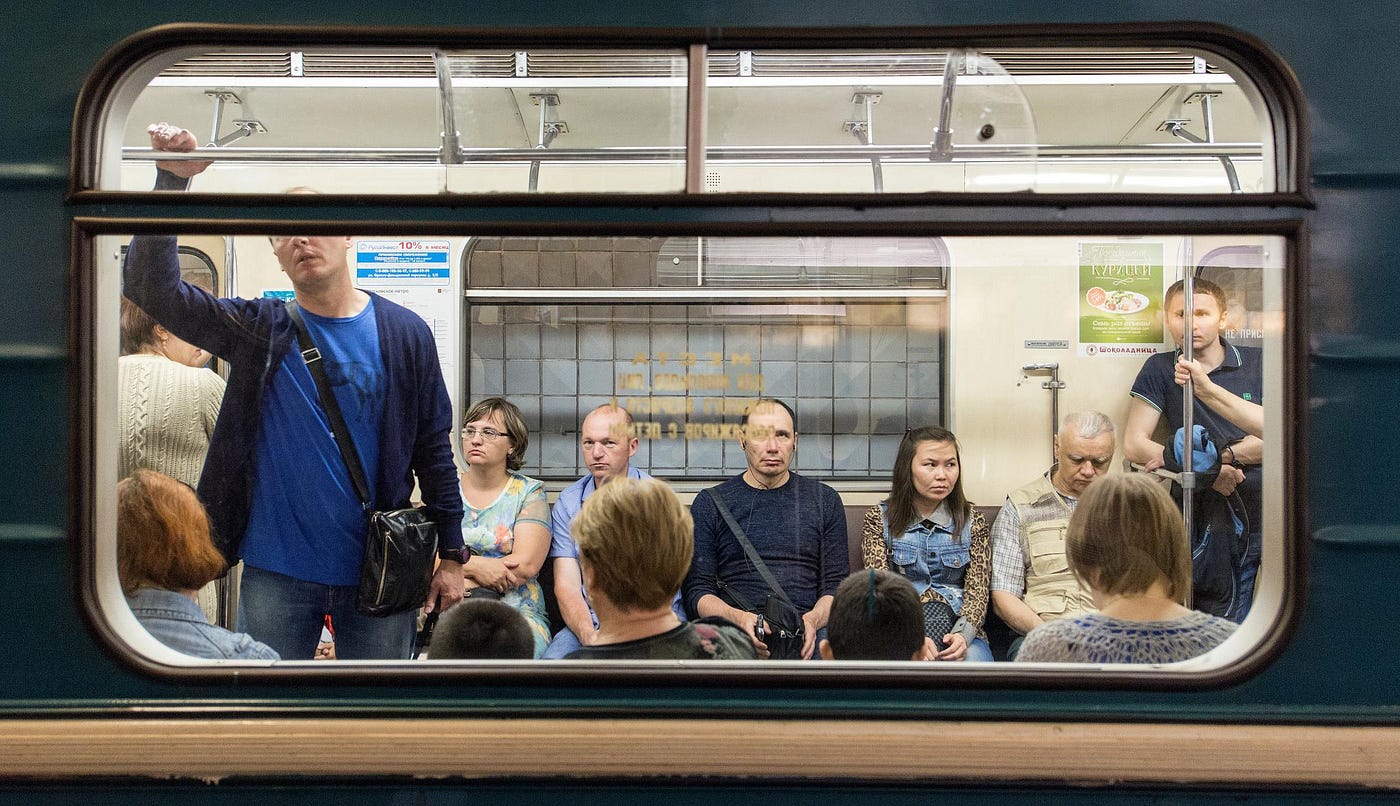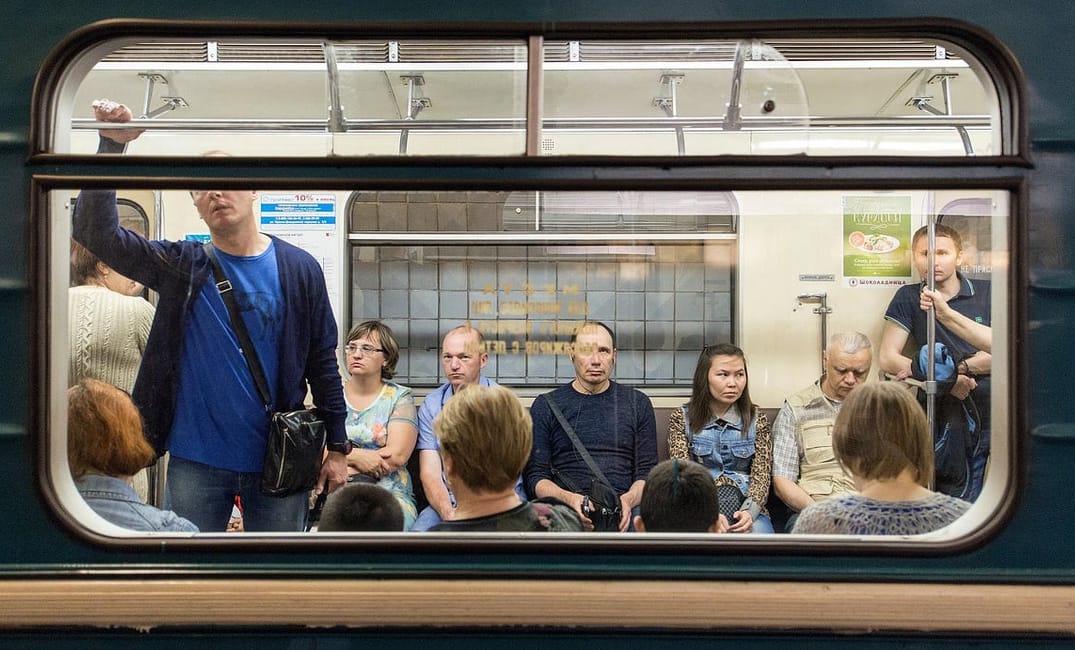
I usually ride my bike home from work. Pedaling down Market Street, dodging traffic, and passing the Bay Bridge as I swoop onto the Embarcadero, I feel both invigorated and connected to the city. Like, oh, so this is what living in San Francisco is all about. But on some days, when it’s raining or I feel lazy, I take Muni home, and riding Muni produces the opposite kind of feeling. When I’m on the bus, clinging to a lukewarm handlebar, armpit to armpit with strangers’ flesh, I feel less like a person on a bus and more like a caged rat in transit.
The truth is, riding Muni gives me severe anxiety — the kind that blinds, deafens, and renders the rest of my senses numb. To calm the agoraphobic storm the experience conjures in my head, I close my eyes and repeat in my mind, “This is impermanent. This is impermanent. I am the master of my emotional symmetry.” It’s the kind of hokey New Age mantra whose effectiveness is contingent upon my ability to embrace indignity.
January 6, 2015 — the first Monday of the new year — was one of those days when I took Muni home. I squeezed on at 3rd and Mission, wedging myself into a cluster of people who felt much larger than me, some of them breathing openmouthedly to the point where I could smell their wild varieties of breath, hot fumes that mingled with other wet scents to form a humid, vaguely digestible fog of unventilated human odor.
Despite this, I was initially fine. I kept calm as the bus jerked and rattled, swaying alongside my fellow passengers in an amorphous huddle. I even stayed cool when someone’s generous butt cozied up against mine. It was as the bus trundled into Chinatown and my eyes chanced upon a display of dead pigs hanging upside down in a red storefront window that I started freaking out.
First, there were the pigs. You hate to see dead pigs. Very unsettling. But then from somewhere in the front of the bus a lady started screaming — a real keening lament, similar in pitch and volume to the sound I imagine those pigs made when they were slaughtered. My heart rate spiked. Cold sweat spidered down my back. Then the bus lurched with particular violence, and everyone bowled into each other. The woman continued screaming. I regained my footing and closed my eyes, repeating my safe words, but that didn’t help.
Flash bombs of paranoia detonated in my head, fluorescent and vivid against the underside of my eyelids. I’m wasting my youth in a cubicle — POP. My writing sucks — POP. My family isn’t happy — POP. My girlfriend doesn’t like me — POP, POP. My friends hate me — POP, POP, POP. I felt invisible ants crawling on me, and a rancid taste like vinegar and orange juice frothed in my throat. Then, whoever the crazy lady was screaming at started giving it right back to her in a high-pitched, kitchen-knife voice: “Fuck you, lady! Fuck you, lady!” A crying baby joined the chorus. The Muni driver shouted over his shoulder, “Shut up!”
All the while my fellow passengers stared ahead blankly, enduring with dead eyes and passive, as if none of this were actually going on. Their disinterest seemed almost stoic. I thought my head was going to explode. I again chanted to myself, “This is impermanent. This is impermanent. I am the master of my emotional symmetry.”
To be fair, I have struggled with anxiety — or the Badness, as I call my personal brand of it — for most of my life. For as long as I can remember, I’ve been susceptible to sudden, almost thermogenic attacks of nervousness and paranoia. To combat these attacks, I’ve frequented therapists, self-medicated (both with substances that might have medicinal value and those that definitely do not), and, yes, developed mantras — all to varying degrees of effectiveness.
The sources of my anxiety are wide ranging, but until I moved to San Francisco, public transportation was not one of them. For a long time, in fact — back when I was living with my parents in Walnut Creek because I’d just started working and didn’t have any money — riding Muni represented a reprieve from anxiety. If anything, I looked forward to riding the bus. It made me feel like an adult and independent, as silly as that may sound. I told myself that once I’d saved up enough cash and found an apartment of my own, all the Badness that pervaded my thoughts would evaporate, and I would feel — finally — unburdened and happy.
Predictably, the Badness didn’t evaporate so much as transmogrify. I’ve come to realize that riding Muni, while unpleasant, is more than anything else a trigger — the latest in a long line, only for whatever reason more intense. The paranoia I feel while riding is never actually about the crowds or the discomfort or the potential for contracting incurable diseases; it’s about my friends, my family, and the gnawing sense that I should try to be a better person — the same shit I’ve always been anxious about, in other words. Muni has become the literal embodiment of my unconscious, a rolling hothouse from which every regret and doubt and humiliation I’ve ever experienced bursts into toxic life.
But still, does everyone on the bus loathe the experience of riding it as much as I do? Does Muni inspire this sort of demented, caged-rat desperation in other people? These were the questions pinballing around in my head when, at Union and Van Ness, the stop before my own, the man whose butt had 20 minutes earlier rubbed against my own sat down in the plastic seat across from me. He was an African American man of considerable girth who seemed desperate for both greater lung capacity and a wider seat to sit on. As he sat, we made eye contact, sparking the brief, sympathetic rapport you sometimes experience on public transit.
“This bus, man,” he said in a drawn E chord. My self-pity dissolved like aspirin tablets in my stomach. If I’d had a flask, I would have passed it to him.
“I hear you, man,” I replied.
A few minutes later, as I got off the bus, I started thinking that maybe the questions I’d fallen into the habit of asking weren’t relevant — or at least not useful. Because the truth is, when you’re transfixed by a moment, it’s nearly impossible to consider that what you’re going through, what you’re feeling, is ultimately inconsequential. Of course, no one likes riding Muni at rush hour. It’s not just you, Daniel. The Badness is not a product of anything tangible, so much as it is a side effect of yourself.







